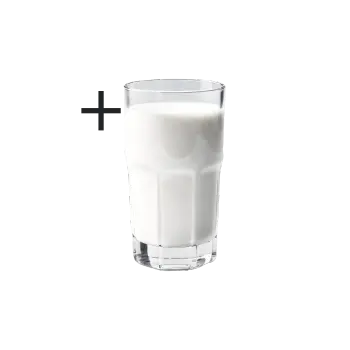About the allergen cow's milk
The two main proteins in milk that usually cause allergic reactions are casein and whey protein. Casein makes up about 80% of the protein in milk, while whey protein makes up the remaining 20%. It is possible that a person may be allergic to either casein or whey protein or both. It is also possible that people with a milk allergy may react to proteins found in milk derivatives made from casein and whey protein, such as cheese or yogurt.
It is one of the most common allergies in children and affects approximately 2-7.5% of all infants in Sweden. The allergy usually goes away before the child starts school, but for some the allergy remains and they have to live with it as an adult.
Symptoms of allergy to cow's milk
Symptoms of cow's milk allergy vary from person to person and can include skin reactions such as rash and itching, digestive problems such as nausea, vomiting and diarrhea, difficulty breathing and, in rare cases, anaphylaxis.
How can I find out if I am allergic to cow's milk?
An allergy to cow's milk can be investigated using a blood test that measures the level of immunoglobulin E (IgE) antibodies against milk proteins. This test is called the milk protein-specific IgE test.
If the results show that the level of IgE antibodies against milk proteins is high, it indicates an allergic reaction to cow's milk. However, this does not necessarily mean that you are experiencing symptoms due to the allergy.
It is important to note that an allergy test cannot prove with 100% certainty whether you are allergic or not. If you suspect that you have an allergy to cow's milk or other foods, it is important to seek the advice of a doctor or allergy specialist for proper diagnosis and treatment.
Can you have a cow's milk allergy without elevated IgE antibodies?
Yes, it is possible to have an allergic reaction to cow's milk without having elevated levels of IgE antibodies in the blood. This type of allergy is called non-IgE-mediated allergy. This is a less common type of cow's milk allergy compared to IgE-mediated allergy. In non-IgE-mediated allergy, it is instead other immune cells, such as T cells, that react against proteins in cow's milk and cause an allergic reaction. The symptoms of a non-IgE-mediated allergic reaction to cow's milk can include stomach pain, vomiting and diarrhea, as well as skin rash and difficulty breathing. If you suspect that you have a cow's milk allergy that is non-IgE mediated, you should contact a doctor or allergy specialist for a proper diagnosis and treatment.
What can I do myself if I am allergic to cow's milk?
If you have an allergy to cow's milk, you need to avoid all foods containing milk or milk derivatives. This includes milk, cheese, yogurt, ice cream, butter, and many other foods that may contain milk as an ingredient.
It is also important to read food labels carefully and check for allergen information. People with a cow's milk allergy may need to consult a doctor or a dietitian to ensure they are getting enough nutrition and not missing out on important nutrients.
Cow's milk allergy and lactose intolerance – two completely different conditions
Cow's milk allergy and lactose intolerance are two completely different conditions, although both can cause stomach problems after consuming milk. Cow's milk allergy is an immunological reaction to proteins in milk, while lactose intolerance is due to a lack of the enzyme lactase, which makes it difficult for the body to break down the milk sugar lactose.
























